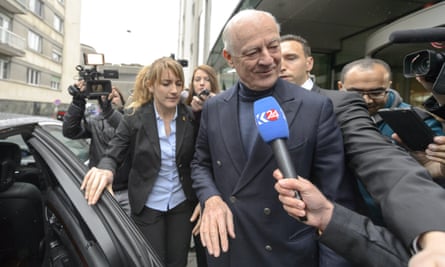Fifty people were killed and dozens more injured on Sunday in coordinated bombings near a Shia Muslim shrine in Damascus as Syrian government and opposition officials exchanged accusations at long-awaited UN peace talks in Geneva. The attacks were claimed by Islamic State (Isis).
Syrian state media said the first blast was caused by a car bomb and then two suicide bombers blew themselves up near the revered Sayyida Zeinab mosque in the south of the capital, a site of pilgrimage for Shia Muslims from Iran, Iraq, Lebanon and elsewhere. Broadcasts from the scene showed footage of burning buildings, a huge crater in the road, and charred and wrecked vehicles.
“Two soldiers of the caliphate carried out martyrdom operations in a den of the infidels in the Sayyida Zeinab area, killing nearly 50 and injuring around 120,” Isis said in a statement circulated on social media.
It was one of the worst attacks in a government-controlled area of Damascus and one where there has been a strong presence of Hezbollah and other Shia militia forces in recent months. It served as another vicious and bloody reminder of what is at stake in the Geneva talks, which are yet to produce anything more than anodyne statements by both parties.
Airstrikes by both Syrian and Russian warplanes have continued unabated, as have sieges of 15 areas where hundreds of thousands of people are living in rapidly deteriorating conditions. The opposition Syrian national coalition said on Sunday that 34 civilians, including three women and six children, had been killed since the Swiss talks formally opened last Friday – a week after the talks were originally scheduled.
Staffan de Mistura, the UN envoy for Syria, paid a “courtesy call” to opposition negotiators on Sunday, who insisted they will not enter into negotiations of any kind until the implementation of a UN security council resolution demanding that all parties allow aid access, release detainees, end sieges and stop targeting civilian areas.
De Mistura is to meet each delegation separately on Monday for what the UN calls “proximity talks” and then shuttle between them, since there is not enough common ground between them to meet without immediate collapse. Last time talks were held in Geneva, two years ago, the Syrian parties exchanged insults and the negotiations broke up without result. It will clearly be a difficult process.

“We only came to Geneva after receiving assurances and commitments,” Basma Kodmani, an opposition negotiator, told reporters. “And we have precise commitments on the fact there would be serious progress on the humanitarian situation. We can’t start political negotiations until we have those gestures [in place].” The opposition’s hope is the release of prisoners held by the government will be enough to unblock the impasse.
But Bashar al-Jaafari, Syria’s UN ambassador and the head of the Syrian government team, said the opposition was “not serious” about wanting peace. Damascus has consistently dismissed its opponents as “terrorists” and insists that two anti-Assad rebel groups – the Islamist Ahrar al-Sham and Jaysh al-Islam – be barred from talks and proscribed, along with Isis and Jabhat al-Nusra, al-Qaida’s Syrian affiliate. “We will never sit down directly with terrorists nor have dialogue with them,” said Omran al-Zoubi, the Syrian minister of information.
The US, Britain, France and Saudi Arabia are working hard to ensure that the talks do go ahead, and are supporting the opposition closely. The US secretary of state, John Kerry, angered the Syrian negotiators in a stormy meeting in Riyadh last week but then persuaded them to overcome their reservations and attend the talks, which he described as “a pivotal phase” in international efforts to curb violence in Syria.

“I appeal to both sides to make the most of this moment, to seize the opportunity for serious negotiations, to negotiate in good faith with the goal of making concrete, measurable progress,” Kerry he said in a statement on Sunday. Adel al-Jubeir, the Saudi foreign minister, said pointedly his country would continue to back the anti-Assad rebels whatever happened in Geneva. Many anti-Assad Syrians mistrust the US and believe it has moved too close to Russia’s position.
De Mistura is planning six months of talks, first seeking a ceasefire and later working toward a political settlement to a war that has killed more than 250,000 people, driven more than 10 million from their homes and drawn in regional and global powers since it began nearly five years ago. They key issue remains a political transition and Assad’s own future – though how that will be addressed remains unclear.
International attention will be focused on Syria again later this week when world leaders meet in London for the Supporting Syria and the Region conference 2016. Efforts to mitigate the effects of the world’s worst humanitarian crisis look likely to proceed more rapidly than the Geneva talks.
